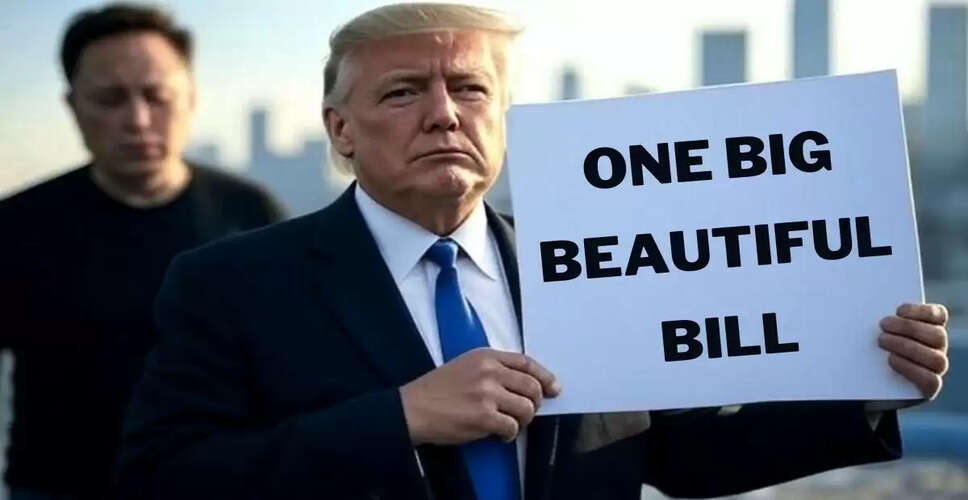Elon Musk Steps Down from DOGE Amid Controversial Spending Bill

Musk's Departure from DOGE
Washington: On Thursday, Elon Musk, the CEO of Tesla, resigned from his role as a 'Special Government Employee' amidst significant protests. He expressed gratitude to President Donald Trump for the chance to help minimize government waste.
In a message posted on X, Musk stated, "As my time as a Special Government Employee concludes, I want to thank President Donald Trump for allowing me to work on reducing wasteful expenditures. The DOGE initiative will continue to grow as it becomes integral to government operations."
Musk also mentioned his intention to continue advising the president even after his departure. He remarked, "I plan to remain a friend and advisor, and I am available to assist the president with any tasks he may need help with."
President Trump commended Musk for his exceptional leadership of the DOGE (Department of Government Efficiency) and assured that the department, which Musk established to streamline funding and enhance the US economy, will persist.
Understanding DOGE
Despite its formal title, DOGE is not an official government agency; only Congress can create such entities. Instead, President Trump issued an executive order to form this advisory group.
The executive order outlines that part of DOGE's mission is to modernize IT systems to improve efficiency, with a completion deadline set for July 2026, although Trump could extend this timeline.
Many individuals working for DOGE appear to be young professionals with technical expertise but limited government experience.
The 'One Big Beautiful Bill'
The bill, officially known as the 'One Big Beautiful Bill Act of 2025' (OBBBA), spans over 1000 pages and was narrowly approved by the US House of Representatives last week. It is now set to be reviewed by the Senate and includes commitments to increase defense spending and implement multi-trillion-dollar tax reductions.
This legislation aims to extend or solidify various tax provisions from the 2017 Tax Cuts and Jobs Act (TCJA), which are due to expire, while also introducing new tax-related measures.
The bill proposes expanded tax cuts, additional eligibility criteria for federal benefits, and an increase in the national debt ceiling, all contentious issues that were agreed upon by the House with a vote of 215 to 214.
It incorporates significant tax reductions from the 2017 TCJA, allocates more resources for border security, imposes work requirements for Medicaid recipients, and reduces tax incentives for clean energy projects.
The Congressional Budget Office estimates that the tax provisions in this package could increase the budget deficit by $3.8 trillion by 2034.
Musk's Concerns Over the Bill
Musk expressed apprehensions regarding Trump's extensive tax and spending cuts proposal, stating in a video that he believes it would exacerbate the US budget deficit and undermine the efforts of the Department of Government Efficiency.
"I was disheartened to see the substantial spending bill, which increases the budget deficit rather than reducing it, and undermines the work of the DOGE team," Musk was quoted as saying.
"A bill can be either large or beautiful, but I doubt it can be both," he added.
Despite Musk's exit, DOGE is expected to continue its operations, with staff members remaining embedded across federal agencies for the foreseeable future.
Future Developments
With Musk's departure, the 'One Big Beautiful Bill' is now on its way to the Senate, where Trump is keen to see it approved and has urged the Senate to act swiftly.
"It's time for our friends in the United States Senate to get to work and send this Bill to my desk AS SOON AS POSSIBLE!" he posted on social media on Thursday.
The Senate will need to approve the bill and may make some adjustments, as some lawmakers have already indicated potential changes. If modifications are made, it will return to the House for another critical vote.
Democrats, lacking a majority in both the House and Senate, have criticized the bill, particularly regarding changes to Medicaid and SNAP.
House Minority Leader Hakeem Jeffries labeled the bill a "reckless, regressive, and reprehensible GOP tax scam" and pledged to use it against Republicans in the upcoming midterm elections in 2026.
The White House warned that failure to pass the bill could lead to a $4 trillion tax increase, potentially resulting in economic downturns.
